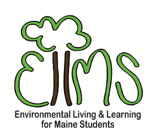Environmental Living and Learning for Maine Students (ELLMS)
 Who we are: Environmental Living and Learning for Maine Students (ELLMS) is a collaboration of overnight environmental learning centers (Chewonki, The Ecology School, Schoodic Institute, and UMaine 4-H Camp and Learning Centers at Bryant Pond and Tanglewood). Since 2011, the ELLMS Project has provided over $1.3 million in program scholarships to Maine schools. ELLMS Centers work in partnership with schools and other partners to facilitate learning opportunities that empower students and teachers to create healthy, vibrant Maine communities.
Who we are: Environmental Living and Learning for Maine Students (ELLMS) is a collaboration of overnight environmental learning centers (Chewonki, The Ecology School, Schoodic Institute, and UMaine 4-H Camp and Learning Centers at Bryant Pond and Tanglewood). Since 2011, the ELLMS Project has provided over $1.3 million in program scholarships to Maine schools. ELLMS Centers work in partnership with schools and other partners to facilitate learning opportunities that empower students and teachers to create healthy, vibrant Maine communities.
Mission: Environmental Living and Learning for Maine Students (ELLMS) collaborates to promote best-in-class overnight environmental learning in Maine for all students, create model community-based education partnerships, and contribute to statewide initiatives.
Vision: We envision partnering with schools and other community partners to connect vibrant school communities with the natural landscapes of Maine–the lands, waterways, and ocean– so that Maine students understand the connection between their health and the health of the natural world, and become civically engaged members of their communities, towns, and regions. Together, we can prepare students to be 21st-century learners. In twenty years there is a network of overnight Environmental Learning Centers that give all students in Maine access to holistic environmental learning and facilitate community-based education innovation.
What Do We Hope to Accomplish Together?
- Academic Success: Improved attendance, academic performance, and graduation rates, and preparation for work and citizenship.
- Healthy Students: Healthy lifestyles, increased recreation, nutritious food choices, improved physical and mental health.
- Community Engagement and Stewardship: Leadership and collaboration skills, an ethic of citizenship, stewardship, and service; contributions to a healthy local economy, volunteers and partners engaged in schools, and sustained local education funding.
Our shared education model:
- Use systems thinking, ecology, and sustainability integrated into our program models
- Provide three-day or longer overnight environmental learning programs
- Couple outdoor and in-school experiences over multiple years
- Foster teacher-driven professional development through ongoing collaboration
- Have a robust social-emotional curriculum
- Have a foundation in strong science and community-based/civics curriculum



